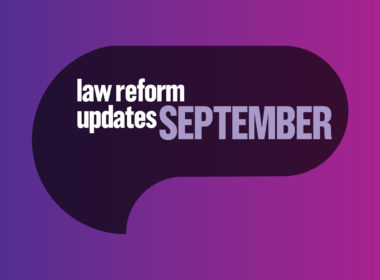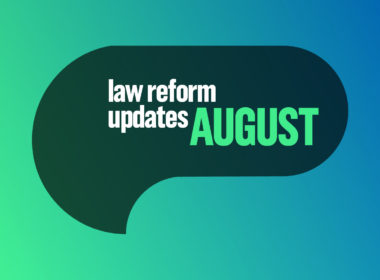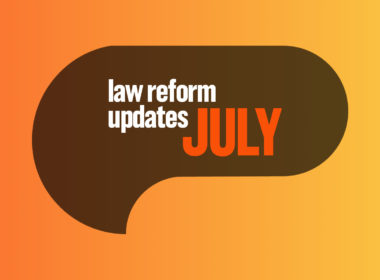Key developments
- Public consultation draft of the Crimes Legislation Amendment (Coercive Control) Bill 2022
- Home building compensation reform – Discussion Paper
- Aged Care Amendment (Implementing Care) Reform Bill 2022
- National Anti-Corruption Commission
- List of Independent Administrators
- Audit of the NSW Trustee and Guardian
- Facilitating and administering Aboriginal land claim processes
- Department of Home Affairs Discussion Paper – Humanitarian Program 2022-2023
- Fair Work Commission Consultation – New enterprise agreements statistical reports
- Interoperability pricing for Electronic Lodgment Network Operators – IPART Issues Paper
- IRO Complaints and Compliments Policy and Unreasonable Conduct Policy and Procedures
- Fair Work Amendment (Paid Family and Domestic Violence Leave) Bill 2022
- Draft Motor Accident Guidelines – Version 9
- Draft NSW Coastal Design Guidelines
Public consultation draft of the Crimes Legislation Amendment (Coercive Control) Bill 2022
The Criminal Law Committee and Family Issues Committee contributed to a submission to the Department of Communities and Justice on the public consultation draft of the Crimes Legislation Amendment (Coercive Control) Bill 2022 (‘draft Bill’).
The submission raised concerns that the draft Bill is too complex, the offence too broad, and that it creates significant procedural fairness issues for an accused resulting from lack of particularisation. We noted the current broad-brush offence in the draft Bill risks criminalising dynamics and behaviour within intimate relationships that do not warrant moral, let alone criminal, sanction. We raised particular concern that, as currently drafted, the offence will lead to further over-policing of Aboriginal communities, which are already disproportionately policed for offensive language.
We submitted that the offence, which carries a maximum term of seven years imprisonment, should capture a calculated, persistent, manipulative course of conduct that is necessarily intended to cause coercive control of a person. Specific intent is an essential safeguard and recklessness is too low a threshold.
In our view, the offence will be very difficult for the accused, complainants and juries to understand. We made a number of suggestions to amend the draft Bill. We strongly supported the need for ongoing and comprehensive training of relevant stakeholders and a shorter legislative review period.
Home building compensation reform – Discussion Paper
The Property Law and Business Law Committees contributed to a submission to the State Insurance Regulatory Authority (‘SIRA’) in response to the Discussion Paper issued as part of the ongoing review of the Home Building Act 1989 and the Home Building Compensation Fund scheme.
Our submission welcomed the breadth of the review and supported a number of reform proposals including that:
- unpaid premiums and claim costs for uninsured work should be recoverable from building businesses and developers that have not complied with their insurance obligations, including from culpable directors;
- the claims notification process should be streamlined by allowing homeowners to claim where there has been non-compliance with a rectification order;
- the minimum amount of cover should be increased from $340,000 to $400,000; and
- exemptions from insurance should be provided for some housing services, such as the development of affordable housing.
We opposed several reform proposals including that:
- victims of unlawfully uninsured work should be able to claim on the home building compensation scheme, but we supported ex gratia payments in limited circumstances, such as use of fraudulent insurance documents;
- the claims lodgement period be shortened; and
- homeowners and building businesses be able to agree to opt-out of insurance for work of over $2 million to a single dwelling.
Aged Care Amendment (Implementing Care) Reform Bill 2022
The Elder Law, Capacity and Succession Committee contributed to a submission to the Law Council relating to a Senate Community Affairs Legislation Committee inquiry into the Aged Care Amendment (Implementing Care Reform) Bill 2022 (Cth). The Bill responds to Royal Commission into Aged Care Quality and Safety recommendations about staffing in aged care. In our view, the Bill should prioritise quality and safety of care, in ways that avoid undue or unnecessary administrative burden on aged care providers, to help to preserve availability and choice of care for consumers.
In our submission, we agreed that aged care facilities should have at least one registered nurse on site at all times with only limited, temporary exemptions, and suggested that larger facilities should have proportionally more registered nurses on site. The effectiveness of these measures, however, will depend on addressing the current shortage of registered nurses in aged care.
We suggested costs for home care services should be capped and strongly regulated, to ensure quality of care is prioritised, and that costs should be transparent and allow for freedom of movement between care services.
We supported transparency of information on providers’ expenditure on services, while noting reporting obligations should not erode the capacity to deliver quality and safety of care.
National Anti-Corruption Commission
Prior to the release of the National Anti-Corruption Bill 2022, the Public Law Committee contributed to a preliminary submission to the Law Council of Australia. The Law Council sought the Law Society’s input on discrete issues which are likely to arise in Commonwealth Government consultations on a proposed new model for a National Anti-Corruption Commission (‘NACC’), against the backdrop of the lapsed draft Commonwealth Integrity Commission Bill 2020.
The Law Society’s submission suggested:
- The NACC should be empowered to determine whether, and the extent to which, it will examine conduct that occurred prior to the commencement of the enabling legislation.
- The right to judicial review is constitutionally enshrined and should extend to review of interim matters. However, in practice it will only be available to the extent that the NACC makes administrative decisions, rather than findings.
- The NACC must have independence with regards to initiating its own investigations, its budgetary and reporting frameworks, and the framework for appointing Commissioners.
- Whistleblower protections are less likely to be needed if the onus is on the heads of government agencies, rather than on agency officers, to report possible corrupt behaviour.




